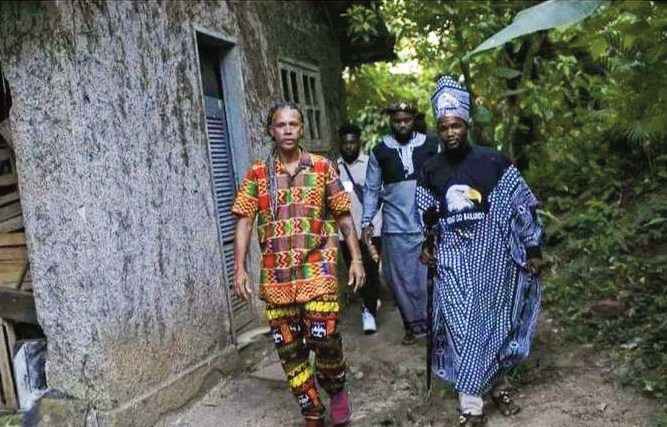get these nets
Veteran
Angola king bridges an ocean, visits slavery diaspora in Brazil
Nov 16, 2023

KING TCHONGOLOLA TCHONGONGA EKUIKUI VI: Visits country’s oldest "quilombo," or community descended from escaped slaves, where nearly 100 people maintain their traditional religion and medicinal plants.
RIO DE JANEIRO (AP) – Residents danced and chanted Wednesday in a community descended from runaway slaves in Rio de Janeiro as they welcomed the visiting monarch of the Bailundo kingdom in Angola where many of the residents trace their ancestry.
King Tchongolola Tchongonga Ekuikui VI visited the community of Camorim as part of a trip to Brazil that began three weeks ago. Camorim dates back to 1614 when it would have been forested land and is Rio`s oldest "quilombo," or community descended from escaped slaves. Nearly 100 people live there today, maintaining their traditional religion and medicinal plants.
"This visit has been on the agenda for a long time," the king told the crowd. “Our presence here is to say to Afro-descendents, to our brothers, here in Brazil and especially in this quilombo, that we are here as roots that are alive, roots that keep this ancestry, roots that maintain our habits and customs," he later told the Associated Press.
…WE ARE HERE AS ROOTS THAT ARE ALIVE, ROOTS THAT KEEP THIS ANCESTRY, ROOTS THAT MAINTAIN OUR HABITS AND CUSTOMS…
King Ekuikui VI arrived in a traditional black-and-white robe and hat, both featuring his kingdom’s emblematic eagle. He is his nation’s most important king, representing the largest Angolan ethnic group. While Bailundo is a non-sovereign kingdom, he holds political importance and is regularly consulted by Angolan authorities.
Residents of Camorim received him with traditional drums, singing and dancing, and they served him feijoada, a typical Brazilian dish made of black beans, pork and rice that some say slaves created.
"The people here in this quilombo are from Angola," said resident Rosilane Almeida, 36. "It’s a bit like if we were celebrating to welcome a relative that came from afar."
On Tuesday, the king visited Rio`s Valongo Wharf, a UNESCO world heritage site where as many as 900,000 slaves made landfall after crossing the Atantic Ocean, and which the international organization considers "the most important physical trace of the arrival of African slaves on the American continent."
Of the 10.5 million Africans who were captured, more than a third disembarked in Brazil, according to the Trans-Atlantic Slave Trade Database. Some experts place that number higher, saying as many as 5 million Africans landed in the country.
And Brazil was the last country in the Western Hemisphere to abolish slavery in 1888. The communities of formerly enslaved people persisted, but it was not until a century later that a new constitution recognized their right to the lands they occupied.
Brazil’s most-recent census of 2022 found quilombos in almost 1,700 municipalities; they are home to 1.3 million people, or about 0.6% of the country’s population.
Almeida, the Camorim resident, said she was looking to hearing how her community`s culture compares to that of their root country. She and others showed King Ekuikui VI the quilombo’s archeological site, where centuries-old ceramics are still being excavated, and its garden of medicinal plants.
"I look to the south, I look to the north, and at the end of the day we are not lost," he told them. "We are here, and there are a lot of people who look majestic."
/i.s3.glbimg.com/v1/AUTH_59edd422c0c84a879bd37670ae4f538a/internal_photos/bs/2023/p/8/E5cDTPSZCSxuc6ZwE9FQ/whatsapp-image-2023-10-26-at-12.32.16.jpeg)
/i.s3.glbimg.com/v1/AUTH_59edd422c0c84a879bd37670ae4f538a/internal_photos/bs/2023/I/D/MjM6ivSwKkSWwBPQ4nKA/whatsapp-image-2023-10-26-at-12.30.39.jpeg)
/i.s3.glbimg.com/v1/AUTH_59edd422c0c84a879bd37670ae4f538a/internal_photos/bs/2022/Z/o/55Ikp8Qv60ZAkSunK4ag/quilombo-cafundo-mel00076-fabio-tito.jpg)
/i.s3.glbimg.com/v1/AUTH_59edd422c0c84a879bd37670ae4f538a/internal_photos/bs/2023/f/u/A46lInSOaLifSoKjhNdQ/whatsapp-image-2023-10-26-at-12.55.46.jpeg)
/i.s3.glbimg.com/v1/AUTH_59edd422c0c84a879bd37670ae4f538a/internal_photos/bs/2022/v/U/b64j1wRSAhJOffnuZIDA/2022-08-18t081631z-102182564-rc2vyv9twpt4-rtrmadp-3-angola-trade-eu-southern-africa.jpg)
/i.s3.glbimg.com/v1/AUTH_59edd422c0c84a879bd37670ae4f538a/internal_photos/bs/2022/J/3/e8wMUSSpqfFdJ0X444WQ/quilombo-cafundo-mel00079-fabio-tito.jpg)